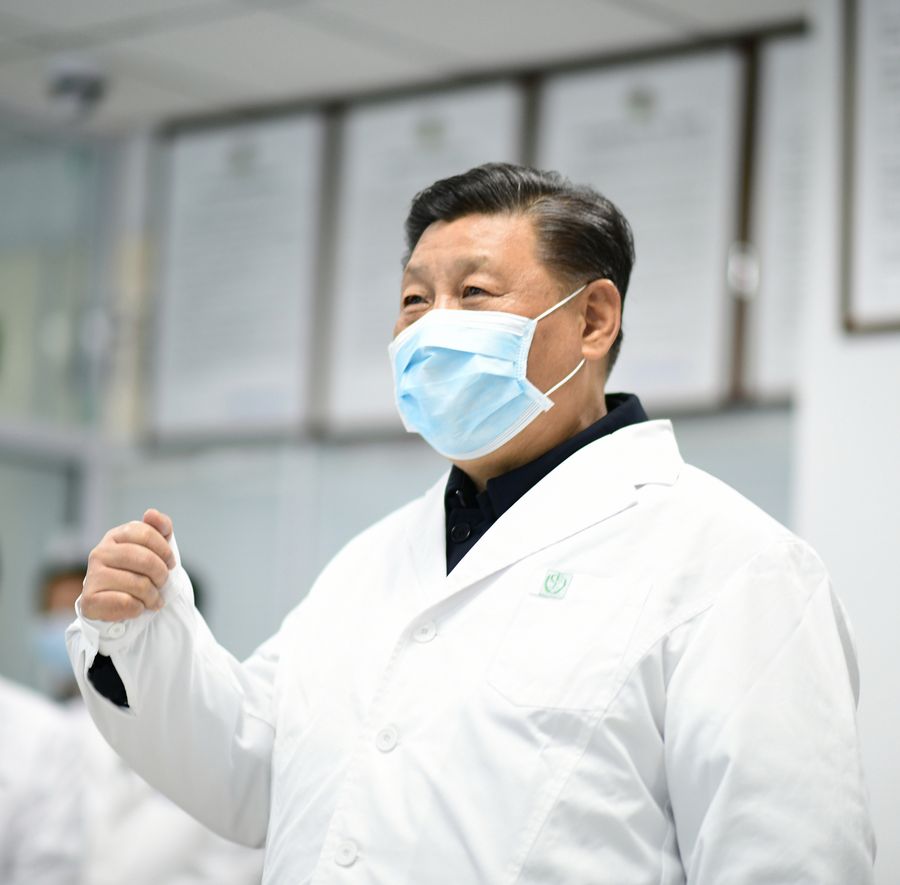Priority set on biosafety reform


Xi: Nation must innovate, boost measures for control and prevention, improve governance
The novel coronavirus outbreak is set to spawn a raft of reform measures so China can boost its biosafety protection and public health emergency management, as experts urged quick steps to revise laws to facilitate stronger measures for coping with similar outbreaks.
In remarks delivered at a meeting of the Central Committee for Deepening Overall Reform on Friday, Xi Jinping, general secretary of the Communist Party of China Central Committee, underlined the importance of innovating and improving control and prevention measures for major outbreaks at the institutional level and bolstering the country's capacity for coping with major public health incidents.
Biological safety must be included in the national security system, and the country must systematically plan control and prevention measures for biosafety risks and improve governance capacities in this regard, said Xi, who is also China's president and chairman of the Central Military Commission.
The country must carefully assess revisions to laws on the prevention and control of contagious diseases and the protection of wildlife, boost legal support for public health and scale up lawmaking in the area, he said.
The country must draw on experience and lessons from the outbreak, he said.
The fact that some of the first infected cases had been exposed to Wuhan's Huanan Seafood Wholesale Market, where an illegal wildlife trade operated, has triggered public outcry and a government ban on wildlife trade.
"The outbreak has exposed weak links and ignored areas in our governance in public environment, and we need to adopt thorough troubleshooting measures to fill up the gaps in public health," Xi said in a speech to the Standing Committee of the Political Bureau of the CPC Central Committee on Feb 3.
"We have long realized the high risks of eating wildlife, but the trade is still large in scale, which has posed a major risk to the safety of public health. We cannot afford any more inaction," he said in the speech, which was published on Saturday.
The country must step up market regulation, resolutely crack down on illegal wildlife markets and trade, get rid of the practice of eating wildlife and control major public health risks from the very source, he said.
Cui Tiankai, China's ambassador to the United States, said in an interview with NPR on Friday that the epidemic has proved that China has set the right goal in modernizing its governance system and capacity, and he is sure that China will learn more from the outbreak and do a better job.
The Standing Committee of the National People's Congress, China's top legislature, had already started the first reading of a draft of the Law on Biological Safety in October.
In his recent remarks, Xi urged a quicker process to create the law.
Qiao Xinsheng, a professor at the Law School of Zhongnan University of Economics and Law in Hubei province, said the latest outbreak has shown the urgent need for China to make a special law on biological safety.
"Biological safety is not only a matter of development of science and technology, but also an issue that directly relates to the safety of the people," he said.
The law on biosafety must lay down the fundamental principles in this regard, provide standards on actions of scientists and come up with ethics rules for scientific research, he said.
Liu Yuanli, dean of the public health school of the Chinese Academy of Medical Sciences, said the outbreak has pointed the way for China to further the reform of the public health system going forward.
The first aspect is in the top-level design, which involves revisions to laws and regulations, such as the Law on the Prevention and Control of Contagious Diseases, to enable stronger response to similar outbreaks, he said.
"The other aspect is to reshape the system, especially the reform of the disease monitoring system and the emergency management mechanism," he said.
In his speech on Friday, Xi also highlighted the need for greater awareness of risk prevention, saying that the coordinated mechanism for judging, evaluating, decision-making and control and prevention for major risks in public health must be refined.
The country must reform its control, prevention and disease treatment mechanism for major contagions, improve its emergency response mechanism and establish a centralized and efficient command system, he said.
Xi noted in his speech on Feb 3 that the epidemic has also exposed a severe shortage in key epidemic prevention materials, such as protective gowns, in the national reserve. He added that improvements to the national reserve system must be made to optimize its categories, scale and structure, and more efforts must be made to ensure the production capacity for key materials for emergency response and to balance regional distribution to ensure an adequate supply in crucial periods.
- Nanchang funds 19 free funeral venues after tragedy
- Massive ice sculpture replicates CNS?Liaoning aircraft carrier
- China to enhance to improve carbon footprint
- Experts advocate vaccinations to combat flu cases
- Singer Lu Han apologizes for inappropriate behavior
- Xi stresses winning tough, protracted and all-out battle against corruption





































